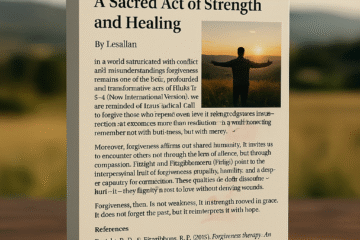Lesallan – September 9, 2024

Exodus 6:28-7:7 (ESV): Detailed Analysis
Version: ESV
Initial Observations & Questions
- The passage begins with God speaking to Moses in Egypt.
- Why does God reiterate His command to Moses here?
- Moses expresses doubt about his ability to speak effectively.
- What does Moses mean by “uncircumcised lips” or “faltering lips”?
- How does the concept of God hardening Pharaoh’s heart fit into the narrative?
- This concept highlights the tension between divine sovereignty and human free will. It demonstrates God’s power and the unfolding of His plan through the plagues and eventual deliverance of Israel.
- How does the theme of divine sovereignty versus human free will play out in the hardening of Pharaoh’s heart in Exodus 7:3 (ESV)?
Structure
Exodus 6:13-27 (ESV) offers a significant genealogical record that emphasizes the lineage of Moses and Aaron. This detailed account serves to legitimize their roles as leaders and God’s chosen instruments in the narrative of the Israelites’ journey from slavery to freedom. By highlighting their ancestry, this passage reinforces the continuity of God’s promises to the patriarchs and sets the foundation for their pivotal roles in the liberation and guidance of the Israelites.
The Book of Exodus is pivotal in portraying the Israelites’ journey from bondage to liberty and emphasizes God’s deliverance, covenant, and guidance. This narrative serves as a testament to God’s enduring faithfulness and the fulfillment of His promises to His people. It also underscores the significance of leadership and divine intervention in the pursuit of freedom and the fulfillment of God’s plan for His chosen people.
This passage aligns with the broader themes of God’s faithfulness, the establishment of the covenant, and the shaping of Israel into a nation under God’s law. Understanding its connections to past events (such as Joseph’s story in Genesis) and future events (such as the giving of the Law at Sinai) is essential for grasping the continuity of God’s plan.
I. Servitude in and Deliverance from Egypt (Exodus 1:1-15:21, ESV)
A. Israel’s Oppression in Egypt (Exodus 1:1-22, ESV)
The Israelites’ growth in number and subsequent enslavement by the Egyptians.
B. Birth and Early Life of Moses (Exodus 2:1-25, ESV)
Moses’ birth, adoption by Pharaoh’s daughter, and his flight to Midian after killing an Egyptian.
C. The Call of Moses (Exodus 3:1-4:17, ESV)
God’s appearance to Moses in the burning bush and his commissioning to lead Israel out of Egypt.
D. Moses Returns to Egypt (Exodus 4:18-7:7, ESV)
Moses returned to Egypt and had initial confrontations with the pharaoh.
E. The Ten Plagues (Exodus 7:8-12:30, ESV)
The plagues God sends upon Egypt to compel Pharaoh to release the Israelites.
F. The Exodus (Exodus 12:31-15:21, ESV)
The departure of the Israelites from Egypt, the crossing of the Red Sea, and the song of deliverance.
II. Journey to Sinai (Exodus 15:22-18:27, ESV)
A. The Wilderness of Shur (Exodus 15:22-27, ESV)
The Israelites’ journey through the wilderness and the provision of water at Marah.
B. The Wilderness of Sin (Exodus 16:1-36, ESV)
God’s provision of manna and quail to sustain the Israelites.
C. Water from the Rock (Exodus 17:1-7, ESV)
The miracle of water from the rock at Rephidim.
D. Victory over Amalek (Exodus 17:8-16, ESV)
The battle against the Amalekites and Moses’ role in securing victory.
E. Jethro’s Visit (Exodus 18:1-27, ESV)
Jethro gave Moses advice on delegating judicial responsibilities.
III. Revelation at Sinai (Exodus 19:1-24:18, ESV)
A. Preparation for the Covenant (Exodus 19:1-25, ESV)
The Israelites arrived at Sinai and prepared to receive God’s covenant.
B. The Ten Commandments (Exodus 20:1-17, ESV)
The Ten Commandments were given as the foundation of Israel’s law.
C. The Book of the Covenant (Exodus 20:18-23:33, ESV)
Additional laws and regulations were given to the Israelites.
D. Ratification of the Covenant (Exodus 24:1-18, ESV)
The formal ratification of the covenant between God and Israel.
IV. Instructions for the Tabernacle and Priesthood (Exodus 25:1-31:18, ESV)
A. The Tabernacle (Exodus 25:1-27:21, ESV)
Detailed instructions for the construction of the Tabernacle.
B. The Priestly Garments (Exodus 28:1-43, ESV)
Instructions for the garments of the priests.
C. The Consecration of the Priests (Exodus 29:1-46, ESV)
The consecration ceremony for the priests.
D. Additional Instructions (Exodus 30:1-31:18, ESV)
Further instructions regarding worship and the Sabbath.
V. Rebellion, Forgiveness, and Renewed Presence (Exodus 32:1-34:35, ESV)
A. The Golden Calf (Exodus 32:1-35, ESV)
The Israelites’ rebellion and the making of the golden calf.
B. Moses’ Intercession (Exodus 33:1-23, ESV)
Moses’ intercession on behalf of the Israelites.
C. The Renewal of the Covenant (Exodus 34:1-35, ESV)
The renewal of the covenant and the giving of new tablets of the Law.
VI. Following Instructions (Exodus 35:1-40:38, ESV)
A. The Construction of the Tabernacle (Exodus 35:1-39:43, ESV)
The Israelites’ obedience in constructing the Tabernacle.
B. The Tabernacle Erected and Filled with Glory (Exodus 40:1-38, ESV)
The erection of the Tabernacle and God’s glory filling it.
Words & Phrases
“Faltering lips” (Exodus 6:30, ESV)
What does “faltering lips” signify in this context?
Faltering lips” refers to Moses’ perceived inadequacy in speech, possibly indicating a speech impediment or lack of eloquence.
“Prophet” (Exodus 7:1, ESV)
What role does Aaron play as Moses’ prophet?
Aaron acts as Moses’ spokesperson, conveying God’s messages to Pharaoh as an interpreter.
“Harden Pharaoh’s heart” (Exodus 7:3, ESV)
What does it mean that God will harden Pharaoh’s heart?
This phrase indicates that God will allow Pharaoh’s obstinacy to persist, using it to demonstrate His power through the ensuing plagues.
“Signs and wonders” (Exodus 7:3, ESV)
What are the “signs and wonders” referred to here?
These are the miraculous acts God will perform in Egypt to compel Pharaoh to release the Israelites.
“Deliverance” (Exodus 6:6, ESV)
What does “deliverance” signify in this context?
Deliverance” refers to God’s act of rescuing the Israelites from slavery in Egypt. It signifies liberation, salvation, and the fulfillment of God’s promise to His people.
“I am the LORD” (Exodus 6:29, ESV)
What are the implications for understanding God’s authority and identity?
The phrase “I am the LORD” (Exodus 6:29, ESV) carries significant implications for understanding God’s authority and identity. It serves as a powerful declaration of God’s supreme authority and identity, emphasizing several vital aspects. Firstly, it asserts God’s ultimate authority over all creation, reminding us that His commands and actions are rooted in His sovereign power. Additionally, it reinforces the covenantal relationship between God and the Israelites, reminding them of His faithfulness to fulfill promises made to their ancestors. The use of “LORD” (YHWH) as God’s personal name reveals His eternal and unchanging nature, highlighting His presence and involvement in the lives of His people. Ultimately, this phrase provides assurance of God’s presence and support, reassuring believers that despite challenges and doubts, God is always in control and faithful to deliver them.
In drawing parallels to contemporary issues of leadership, this passage offers invaluable reassurance to believers by emphasizing that God equips and supports those whom He calls, even in the face of self-doubt and inadequacy. This message holds profound significance for local church leaders as they encounter various challenges, serving as a poignant reminder to rely on God’s unwavering strength and guidance. It serves as a wellspring of encouragement, inspiring leaders to operate with steadfast faith and confidence as they navigate the turbulent waters of their responsibilities.
Summary, correlation, & application
God reassures Moses of His plan to deliver Israel despite Moses’ self-doubt and Pharaoh’s hardened heart.
The repeated assurances from God and the meticulously laid-out plan involving prominent figures such as Moses and Aaron underscore the significance of this point. The signs and wonders accompanying their actions further emphasize the divine nature of the events and the unfolding of God’s will. This highlights the intricate and deliberate nature of divine intervention, showcasing the divine power at work through these chosen figures. The unwavering faith and obedience of Moses and Aaron, despite the challenges they faced, serve as powerful examples of human dedication to fulfilling God’s will. As the signs and wonders manifested, they served as a testament to the undeniable presence and authority of God, reinforcing the profound impact of His divine plan on the course of events.
Further questions
- How does the theme of divine sovereignty versus human free will play out in the hardening of Pharaoh’s heart?
- What can modern leaders learn from Moses’ example of humility and reliance on God?



3 Comments
igamingpro · September 11, 2024 at 11:20 am
Usually I do not read article on blogs however I would like to say that this writeup very compelled me to take a look at and do so Your writing taste has been amazed me Thanks quite nice post
Simply sseven · September 12, 2024 at 3:46 pm
Simply Sseven I very delighted to find this internet site on bing, just what I was searching for as well saved to fav
store · September 16, 2024 at 7:58 pm
Hey there You have done a fantastic job I will certainly digg it and personally recommend to my friends Im confident theyll be benefited from this site
Comments are closed.